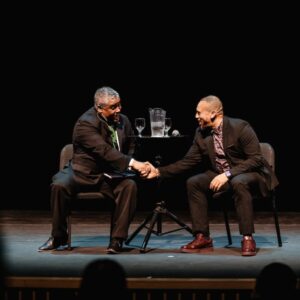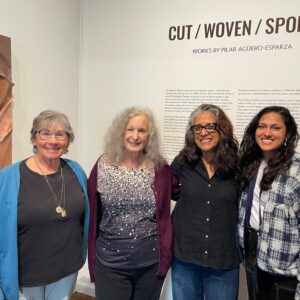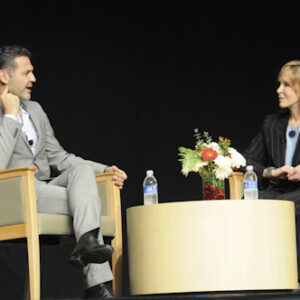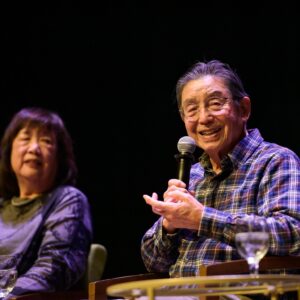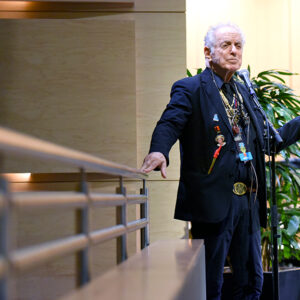An enthusiastic audience of over 200 students, parents and guests warmly welcomed Kyle Maynard to the first event in this year’s Harker Speaker Series, held in the atrium of Nichols Hall on the Saratoga campus. In an introductory video, the audience was introduced to a young child, smiling, bounding through the house, playing football, writing on a computer. Normal things, the kind of moments and events that often pass without recognition. But not for the little boy on the screen.
For Kyle Maynard, even the simplest actions involved monumental amounts of patience, will, frustration and courage. Born on March 24, 1986, with a condition known as congenital amputation that left him with arms that end at the elbows and legs that end near his knees, Maynard discovered earlier than most the power of the human spirit to overcome adversity.
“Everybody here has a disability,” explained Maynard. “And we all have to accept it. We all have challenges that we don’t think we can overcome. And even if we don’t share them with others, we recognize them in ourselves.” From seating himself in the speaker’s chair without assistance, to demonstrating his favorite wrestling moves on stage following his presentation, Maynard is clearly the kind of person who refuses to let his disabilities get in the way.
“It’s easy to look at the challenges and use them as an excuse to quit,” noted Maynard. “Instead, be thankful of the challenges in your life. Instead of having them hold you back, think of them as a way to make you a stronger and better person.” This is clearly what Maynard did when he decided that he wanted to be a champion wrestler.
“It was very tough when I started in grade six,” recalled Maynard. “My dad videotaped me and made me watch every match.” Losing his first 35 straight matches over the course of a year and a half was hard on Maynard. “At the time, I didn’t understand what he was doing. But down the road, my dad made me who I am today.”
His hard work and faith in God propelled Maynard to reach an unimaginable height, winning 36 varsity matches during his senior year in high school, as part of one of the best teams in the Southeast.
Maynard recounted key moments in his life, some painful, some comical, all critical to his growth as a person. Maynard told of how one day his father simply stopped helping him eat and told him to figure it out himself or starve. Or how his grandmother would take him to the market to encourage him to interact with others. These and other moments helped Maynard realize that he wanted to be accepted as just another person, not as a person with disabilities.
Maynard now uses his special insight to help others. Particularly moving was Maynard’s recounting of a young corporal whom he met shortly after the soldier returned from Iraq, very badly injured. Seeing a story of Maynard on television was what got the young man up and ready to continue with his life, notwithstanding the unexpected new challenges.
“Things happen,” Maynard noted. “Stock markets crash, grades fall, and things happen that are outside of our control. Yet it’s up to us to decide how to react.” Today Maynard continues to work with injured soldiers returning from Iraq and Afghanistan, teaching them about hope and opportunity.
In addition, Maynard continues to drive towards new goals, which include training in the sport of mixed martial arts, also known as Brazilian Jiu Jitsu, scheduled to be introduced at the London 2012 Olympics. In characteristic Maynard fashion, he has an eye on making it on to the U.S. Olympic team.
Even Maynard was quick to admit that the likelihood of making the team is small, but then he quickly countered himself by advising everyone to set the bar higher than they think is possible. “Every excuse you make sets you further back,” noted Maynard. Instead, use adversity to improve yourself and take every challenge as an opportunity.
Privately, Maynard told me after the event that his real dream is to climb Mount Everest. I think the smart money is on Maynard conquering this dream as well.
by John Jerney (John Nicolas, Gr. 4; Cristina, Gr. 7)
Ed. Note: Many thanks to those who contributed to the more than $100 that was raised for the Special Olympics at this event.

